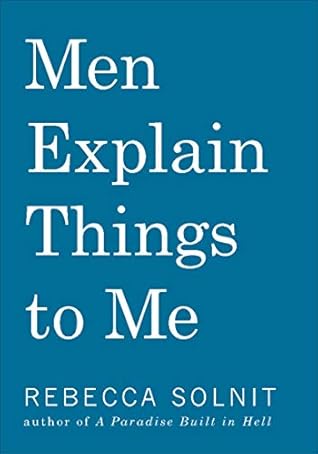More on this book
Community
Kindle Notes & Highlights
This goes way beyond Men Explaining Things, but it’s part of the same archipelago of arrogance.
A Freudian would claim to know what they have and I lack, but intelligence is not situated in the crotch—even if you can write one of Virginia Woolf’s long mellifluous musical sentences about the subtle subjugation of women in the snow with your willie.
We have far more than eighty-seven thousand rapes in this country every year, but each of them is invariably portrayed as an isolated incident.
This is the tradition feminism protested and protests against—not only the extremes but the quotidian situation.
In this part of the world, in the creation stories of the Hopi, Pueblo, Navajo, Choctaw, and Cherokee peoples, Spider Grandmother is the principal creator of the universe.
The future is dark, which is the best thing the future can be, I think. It’s an extraordinary declaration, asserting that the unknown need not be turned into the known through false divination or the projection of grim political or ideological narratives; it’s a celebration of darkness, willing – as that “I think” indicates—to be uncertain even about its own assertion.
Sometimes I think these pretenses at authoritative knowledge are failures of language: the language of bold assertion is simpler, less taxing, than the language of nuance and ambiguity and speculation.
I had just begun trying to make the case for hope in writing, and I argued that you don’t know if your actions are futile; that you don’t have the memory of the future; that the future is indeed dark, which is the best thing it could be; and that, in the end, we always act in the dark. The effects of your actions may unfold in ways you cannot foresee or even imagine. They may unfold long after your death.
To me, the grounds for hope are simply that we don’t know what will happen next, and that the unlikely and the unimaginable transpire quite regularly.
I mean Negative Capability, that is, when a man is capable of being in uncertainties, mysteries, doubts, without any irritable reaching after fact and reason.”
In these circumstances, it is often mild distraction that moves the imagination forward, not uninterrupted concentration. Thinking then works by indirection, sauntering in a roundabout way to places it cannot reach directly.
In “Street Haunting,” she wonders about identity itself: Or is the true self neither this nor that, neither here nor there, but something so varied and wandering that it is only when we give the rein to its wishes and let it take its way unimpeded that we are indeed ourselves?
The worst criticism seeks to have the last word and leave the rest of us in silence; the best opens up an exchange that need never end.
All Woolf’s work as I know it constitutes a sort of Ovidian metamorphosis where the freedom sought is the freedom to continue becoming, exploring, wandering, going beyond. She is an escape artist.
Ultimately the destruction of the Earth is due in part, perhaps in large part, to a failure of the imagination or to its eclipse by systems of accounting that can’t count what matters. The revolt against this destruction is a revolt of the imagination, in favor of subtleties, of pleasures money can’t buy and corporations can’t command, of being producers rather than consumers of meaning, of the slow, the meandering, the digressive, the exploratory, the numinous, the uncertain.
Generations of women have been told they are delusional, confused, manipulative, malicious, conspiratorial, congenitally dishonest, often all at once.
It was as though a handy alibi had been constructed for all transgressive authority, all male perpetrators of crimes against females. She wanted it. She imagined it. She doesn’t know what she is saying.
The results of the McMartin trial’s chaotic interrogations are sometimes cited as evidence that children are unreliable, delusional liars, but it might be useful to remember that it was the adults who were the problem in that case.
Or as my friend, the criminal-defense investigator who knows insanity and violence intimately, put it, “When one begins to lose touch with reality, the ill brain latches obsessively and delusionally onto whatever it’s immersed in—the surrounding culture’s illness.”
You can whittle away at reproductive rights, as conservatives have in most states of the union, but you can’t convince the majority of women that they should have no right to control their own bodies.
Conservatives are now largely fighting rearguard actions. They are trying to reassemble a world that never really existed quite as they imagine it (and to the extent that it did, it existed at the expense of all the people—the vast majority of us—forced to disappear, into the closet, the kitchen, segregated space, invisibility and silence).


